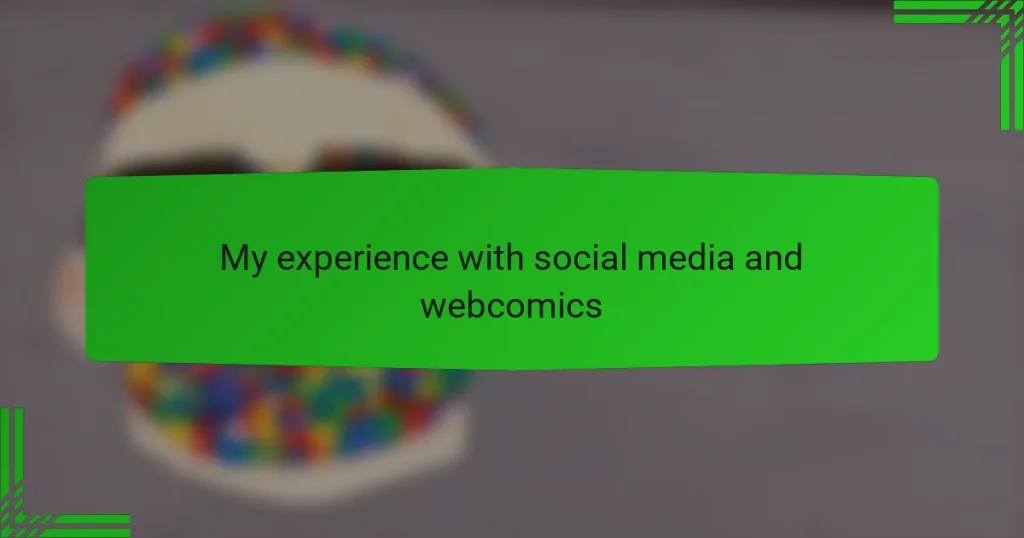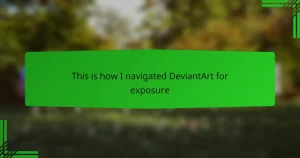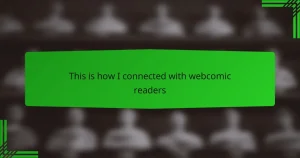Key takeaways
- Webcomic archives offer a platform for creators to share diverse comic styles and engage with readers, fostering a sense of community.
- They play a crucial role in preserving the history of webcomics and connecting new readers with classic works, enhancing emotional connections with characters.
- Popular platforms like Webtoon and Tapas provide opportunities for daily updates and community interactions, enriching the reading experience.
- Creating a webcomic archive involves organizing content, engaging with creators, and promoting the collection to reach a wider audience.
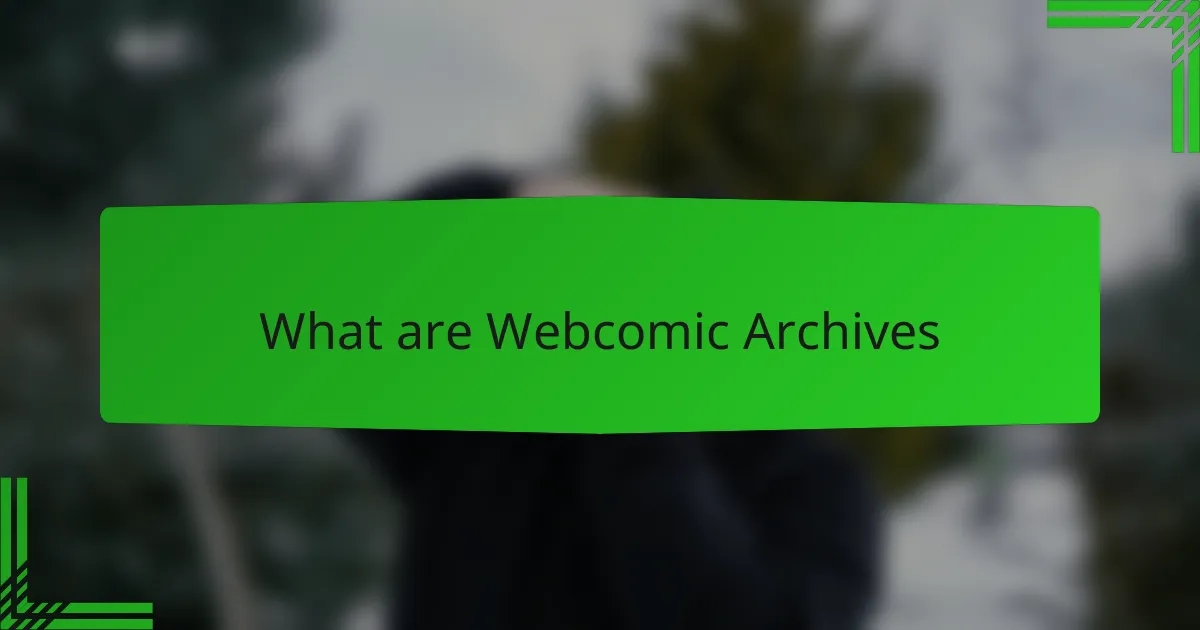
What are webcomic archives
Webcomic archives serve as treasure troves for both budding and seasoned artists, offering a platform where creators can share their comic creations with the world. Personally, I’ve stumbled across some amazing narratives while scrolling through these archives, feeling a deep connection with the stories being told. These collections not only showcase a diverse array of art styles and genres but also allow readers to engage directly with creators, often leading to a sense of community around shared interests.
What I’ve noticed is that webcomic archives not only preserve these gems but also evolve with technology, adapting to how readers consume content online. They provide an accessible way to dive into long-standing stories or discover new ones that resonate with personal experiences. It’s like opening a door to countless worlds, each with its own set of emotions and adventures waiting to be explored.
| Feature | Benefit |
|---|---|
| Accessibility | Available to anyone with internet access |
| Diversity | Wide range of genres and styles |
| Community Engagement | Opportunities for interaction between creators and readers |
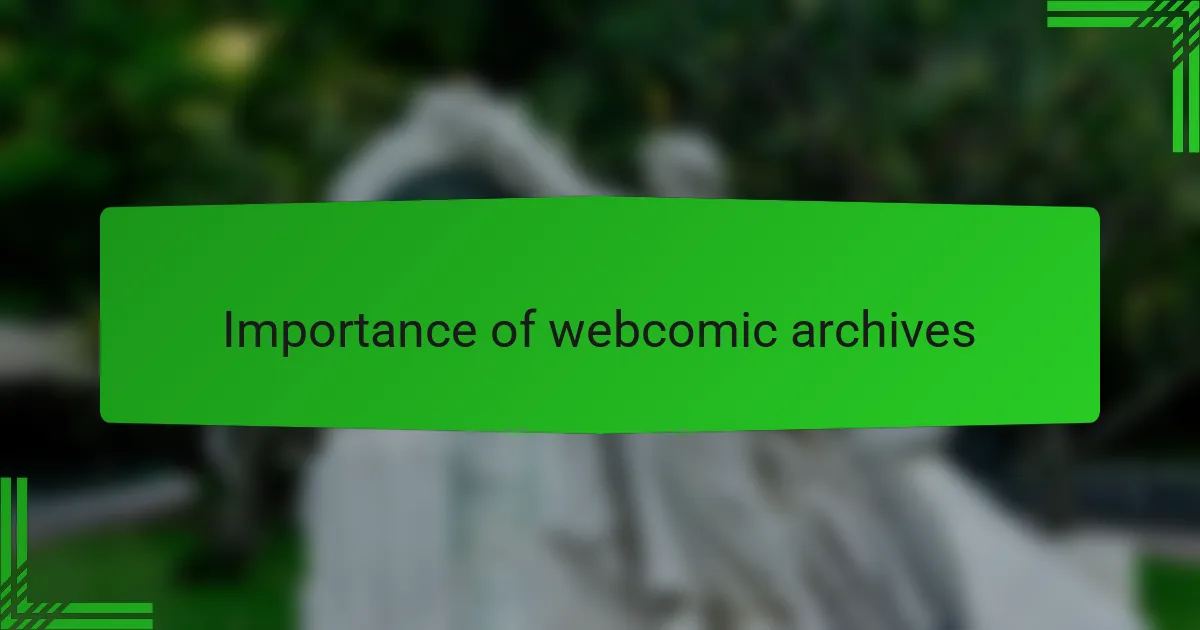
Importance of webcomic archives
Webcomic archives play a vital role in preserving the rich history and evolution of webcomics. When I first discovered webcomics, I often felt like a treasure hunter diving into an endless sea of creativity. Having archives to explore helped me not only find beloved series from years past but also connect with the artists and stories that inspired me.
Moreover, these archives serve as a bridge that connects new readers to foundational works in the community. I remember stumbling upon early webcomics that are now classics. The emotional connection I forged with those characters was profound, and it enriches the entire webcomic landscape. Here are some important aspects of webcomic archives:
- Preservation: Archives keep webcomics safe from being lost or forgotten in the digital shuffle.
- Accessibility: They provide a centralized location for readers to discover new and old stories.
- Community Engagement: Archives often highlight interactions between readers and creators, strengthening the community bonds.
- Historical Context: They allow readers to appreciate the evolution of styles, storytelling, and trends in webcomics.
- Inspiration for Creators: Archives can inspire new artists by showcasing a diverse range of storytelling techniques and artistic styles.

Popular platforms for webcomic archives
As I explored the world of webcomics, I discovered various platforms that serve as excellent archives for both creators and readers. For me, sites like Webtoon and Tapas made it incredibly easy to immerse myself in vibrant stories. I remember the excitement of reading daily updates, always eager to find out how the plot would unfold.
Another aspect that really drew me to these platforms was their community engagement. Readers can comment and share their thoughts, creating a sense of camaraderie among fans. My experience has shown that these interactions often enhance the reading experience, making each new release feel like a shared event.
Here are some popular platforms for webcomic archives:
- Webtoon: A leading platform featuring a wide variety of genres and styles, ideal for mobile reading.
- Tapas: Known for its diverse indie creators, Tapas enables readers to support their favorite comics through tipping and subscriptions.
- Smack Jeeves: A classic site that allows creators to upload their webcomics while building a community around their work.
- LINE Manga: Offers a robust selection of professional comics, often aligned with Japanese manga traditions.
- MangaDex: A hub for manga lovers, featuring fan translations and community-driven content.

How to create a webcomic archive
Creating a webcomic archive is a rewarding venture that allows you to curate and showcase your favorite comics, making them accessible to a wider audience. I remember the joy I felt when I first organized a collection of my favorite webcomics; it was not just about the art and stories, but fostering a sense of community around them.
To effectively set up a webcomic archive, consider these steps:
- Choose a platform: Decide between a personal website, a social media page, or a dedicated comic hosting site.
- Organize your content: Group comics by genre, creator, or publication date to make navigation easier for your audience.
- Include descriptions: Provide summaries or insights about each comic, giving readers context on why you love them.
- Engage with creators: Reach out to the artists; many are thrilled to see their work appreciated and may share your archive.
- Promote your archive: Leverage social media and community forums to drive visitors to your archive and create buzz around the comics you love.

My first experience with webcomic archives
I still remember the moment I first stumbled upon a webcomic archive. It felt like digging through an old trunk filled with hidden treasures. I was new to the concept of webcomics and didn’t realize just how much creativity was waiting for me behind those digital doors. Discovering my first collection felt like being embraced by a community that understood my passion for storytelling.
As I browsed through the various titles and genres, I was struck by the sheer diversity of art styles. Each comic told a unique story that resonated with different aspects of my life. I found myself laughing, crying, and sometimes even pondering the depth of human experience. Isn’t it fascinating how a few images and words can evoke such strong emotions? For me, that’s what webcomic archives are all about—connecting with creators and fellow readers over shared narratives.
The excitement I felt when I first explored those archives can hardly be put into words. I remember being completely absorbed, clicking one link after another, losing track of time. The communal aspect of it really stood out to me; I wasn’t just reading—I was joining a vibrant conversation. Each new find brought a rush of joy, akin to catching up with old friends. That initial experience opened my eyes to the vast potential of webcomics, and I’ve since discovered a wealth of compelling stories waiting to be told.
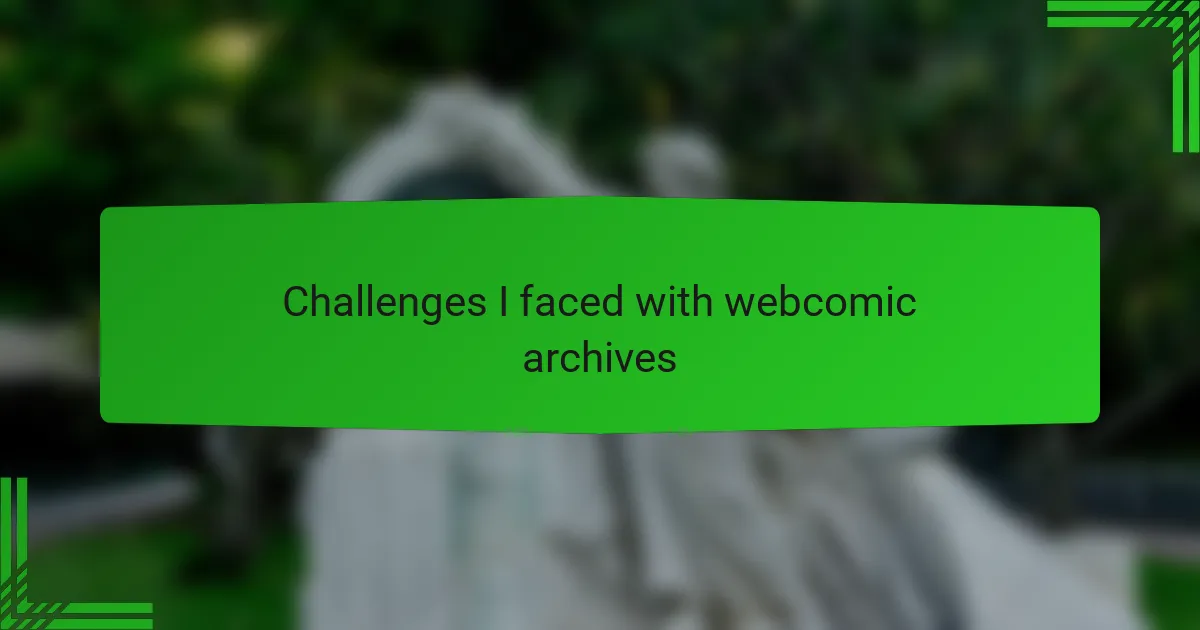
Challenges I faced with webcomic archives
Navigating webcomic archives has certainly been a journey filled with its fair share of challenges. One major hurdle I’ve faced is the inconsistency in organization across various platforms. I often find myself frustrated when I can’t locate specific comics that I loved because they’re poorly tagged or buried under a mountain of unrelated content. It makes me appreciate when an archive has a user-friendly interface.
Another challenge is the uncertainty regarding copyrights. As a creator, I worry about the implications of sharing my work or even referencing others in an archive. It’s a fine line between inspiration and infringement, and I wish there was clearer guidance on how to navigate this landscape. I remember my excitement when I stumbled across an archived comic that had profoundly influenced my style, only to feel a pang of anxiety wondering if that artist was even aware it was being shared.
| Challenge | My Experience |
|---|---|
| Inconsistency | Difficulties locating specific titles due to poor tagging. |
| Copyright Concerns | Feeling anxious about sharing and referencing others’ works. |
